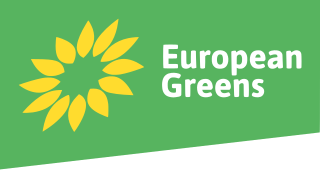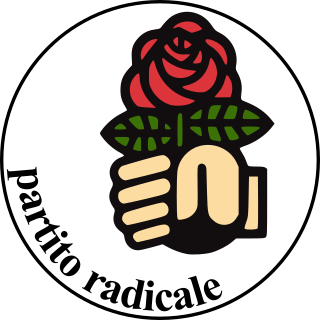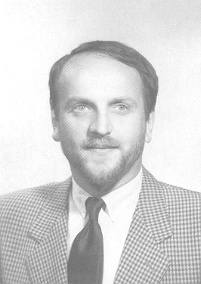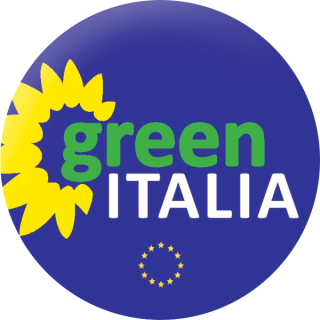Related Research Articles
In politics, a red–green alliance or red–green coalition is an alliance of "red" parties with "green" parties. The alliance is often based on common left political views, especially a shared distrust of corporate or capitalist institutions. While the "red" social-democratic parties tend to focus on the effects of capitalism on the working class, the "green" environmentalist parties tend to focus on the environmental effects of capitalism.

The Green Party of Switzerland is a green political party in Switzerland. It is the fifth-largest party in the National Council of Switzerland and the largest party that is not represented on the Federal Council.

The European Green Party (EGP), also referred to as European Greens, is a transnational, European political party representing national parties from across Europe who share Green values.

The Radical Party was a liberal and libertarian political party in Italy.

The Federation of the Greens, frequently referred to as Greens (Verdi), was a green political party in Italy. It was formed in 1990 by the merger of the Federation of Green Lists and the Rainbow Greens.

Democracy is Freedom – The Daisy, commonly known simply as The Daisy, was a centrist political party in Italy. The party was formed from the merger of three parties within the centre-left coalition: the Italian People's Party, The Democrats and Italian Renewal. The party president and leader was Francesco Rutelli, former mayor of Rome and prime ministerial candidate during the 2001 general election for The Olive Tree coalition, within which The Daisy electoral list won 14.5% of the national vote.

The Democratic Alliance was a social-liberal political party in Italy.
Rainbow Greens was a green political party in Italy.

Italian Renewal was a centrist and liberal political party in Italy.

The Network, whose complete name was Movement for Democracy – The Network, was a political party in Italy led by Leoluca Orlando.

The Segni Pact, officially called Pact of National Rebirth, was a Christian-democratic, centrist and liberal political party in Italy. The party was founded and named after Mario Segni, a former member of the Christian Democrats who was a prominent promoter of referendums.

The Pannella List is a liberal and libertarian association, which was also the electoral list of the Italian Radicals between 1992 and 1999, when it was replaced by the Bonino List.

The Alliance of Progressives was a left-wing political alliance of parties in Italy formed in 1994, with relevant predecessors at local level in 1993. The leader of the alliance was Achille Occhetto. The alliance was a predecessor of the modern-day centre-left coalition.
The Democratic Ecologists are a green faction within the Italian Democratic Party (PD).

The Group of the European Radical Alliance (ERA) was a heterogeneous political group with seats in the European Parliament between 1994 and 1999. It was formed by regionalist parties from the former Rainbow Group, although its largest and dominant member party was the French Energie Radicale.

Edo Ronchi is an Italian engineer and politician. He served as minister of environment and protection of land and sea from 1996 to 2000 in three different cabinets. He was the first Green politician to hold a cabinet post in Italy.

Green Italia was a green political party in Italy.
The centre-left coalition is a political alliance of political parties in Italy active under several forms and names since 1995, when The Olive Tree was formed under the leadership of Romano Prodi. The centre-left coalition has ruled the country for more than fifteen years between 1996 and 2021; to do so, it had mostly to rely on a big tent that went from the more radical left-wing, which had more weight between 1996 and 2008, to the political centre, which had more weight during the 2010s, and its main parties were also part of grand coalitions and national unity governments.

Grazia Francescato is an Italian politician, journalist and activist.
References
- ↑ Miranda Schreurs; Elim Papadakis (2007). The A to Z of the Green Movement. Scarecrow Press. p. 132. ISBN 978-0-8108-7041-3.
- 1 2 Roberto Biorcio (2012). "Italy". In Ferdinand Muller-Rommel; Thomas Poguntke (eds.). Green Parties in National Governments (2nd ed.). Routledge. p. 149. ISBN 978-1-135-28826-6.
- ↑ John Ely (1998). "Green Politics in Europe and the United States". In Margit Mayer; John Ely (eds.). The German Greens: Paradox Between Movement and Party. Temple University Press. p. 195. ISBN 978-1-56639-516-8.
- ↑ Gino Moliterno, ed. (2002). Encyclopedia of Contemporary Italian Culture. Routledge. p. 881. ISBN 978-1-134-75876-0.
- ↑ Roberto Biorcio (2016). "Green Parties in Southern Europe". In Emilie van Haute (ed.). Green Parties in Europe. Routledge. p. 182. ISBN 978-1-317-12454-2.